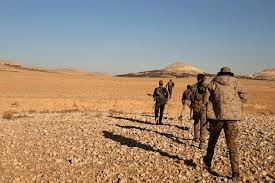Despite the fall of the Assad regime and the formation of a transitional government in Syria, armed groups previously backed by Turkey continue to commit serious human rights violations in northern Syria, Human Rights Watch (HRW) said in a statement released on Wednesday. The watchdog warned that integrating these factions into the official Syrian military without accountability could undermine public trust and jeopardize the country’s fragile transition.
The Syrian National Army (SNA)—a coalition of Turkey-backed factions that fought against the Assad regime—stands accused of arbitrary detention, torture, and extortion, particularly targeting Kurdish civilians and others suspected of ties to the Syrian Democratic Forces (SDF). These abuses have continued since the regime’s collapse in December 2024, with little sign of redress, according to interviews conducted by HRW and corroborated by other rights groups.
“The fall of Assad’s abusive government has meant decades of atrocities have come to an end,” said Adam Coogle, deputy director for the Middle East and North Africa at HRW. “But SNA factions are continuing to detain, extort, and torture residents with impunity.”
Abusive Commanders in Positions of Power
Several former SNA leaders now occupy senior positions within the new Syrian military structure, including:
Mohammad al-Jassem (Abu Amsha), now head of the 62nd Division;
Saif Boulad (Saif Abu Bakr), commander of the 76th Division;
Fehim Isa, appointed assistant to the defense minister for northern affairs;
Ahmad al-Hais (Abu Hatem Shaqra), now leading the 86th Division in the east.HRW and Syrians for Truth and Justice (STJ) have documented dozens of cases of extortion, beatings, and illegal detentions carried out by these factions—especially in Afrin, Shahba, and Nairibiyah.
In one harrowing case from December 2024, a Kurdish man was arrested in Shahba and tortured in a facility reportedly run by Turkish intelligence and SNA military police. He was later found in a hospital with severe injuries. His wife told HRW that he now suffers from permanent neurological damage following a stroke shortly after his release.
In Afrin, multiple residents described being forced to pay bribes ranging from $2,000 to $5,000 to secure the release of detained family members. A woman recounted being abducted and extorted for $850, while her relatives were later beaten and jailed after failing to meet militia demands.
A 61-year-old returnee from Afrin described being abducted, beaten, and ransomed twice—first by members of the Hamzat Division, and again while seeking a basic security clearance from SNA authorities.
Militarized Impunity in the Midst of Transition
The report highlights a growing contradiction: while the transitional government led by President Ahmad al-Sharaa pledges reform and unity, many senior military officials have direct links to past violations.
On February 15, Sharaa visited Afrin and pledged to restore civilian governance and safeguard residents’ rights. A subsequent agreement signed with SDF commander Mazloum Abdi in March laid out a framework for military integration and the return of displaced persons.
Yet field reports indicate that many former SNA factions continue to operate autonomously, despite formal efforts to remove checkpoints. STJ documented 41 arrests by SNA-affiliated units and military police in January and February alone. Hundreds are reportedly still held in Turkish-supervised detention centers.
“If the government continues to shield abusive commanders from accountability, the Syrian people will remain vulnerable to further abuse,” said Coogle.
Calls for Accountability
HRW urged the Syrian transitional government to:
Unify armed forces under civilian oversight;
Investigate past violations and bar implicated commanders from official posts;
Ensure the release of arbitrarily detained persons;
And grant independent monitors full access to all detention facilities, including those operated by former SNA factions or Turkish forces.The organization also called on Turkey—which continues to provide military, logistical, and financial support to SNA groups—to cease backing units implicated in abuses and provide reparations to victims.
International donors and partners were likewise encouraged to support institutional reforms, including mechanisms for judicial accountability and human rights training for security forces.
“Building a credible and lawful military is essential to Syria’s democratic transition,” HRW concluded. “The credibility of the new government depends on whether it will deliver justice and uphold rights—or repeat the cycles of abuse Syrians have endured for decades.”
 Eurasia Press & News
Eurasia Press & News




